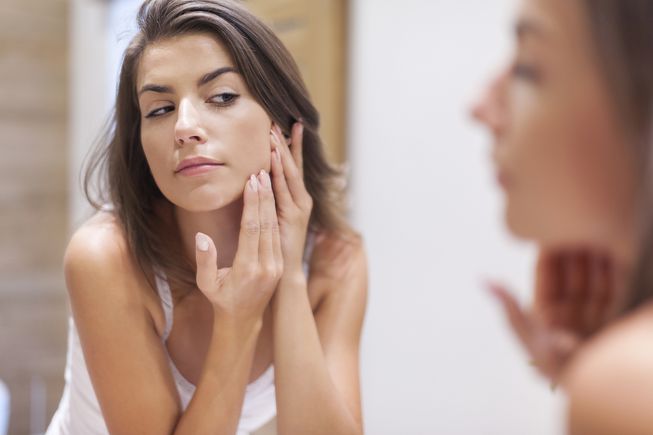Adult Acne: A Fact of Life for Many Women
Adult acne can be particularly frustrating. Treatment that worked so well during adolescence often is ineffective. Over-the-counter topical medications tend to irritate the skin, making acne worse. Some women try numerous treatments without success.
This lack of effectiveness can make one wonder if it really is acne. After all, do adults in midlife and older get acne?
Types of Adult Acne
The truth is that acne can persist well into one’s 30s, 40s, and even 50s. Dermatologists call acne that does not clear by one’s mid-20s persistent acne. Often causing deep-seated, tender, inflamed pimples and nodules, this type of acne is more common in women. Persistent acne tends to form on the lower face, predominately around the mouth, on the chin, and along the jawline.
Adults also develop late-onset acne. Again, women are more susceptible. People who have not had acne for years can suddenly see deep-seated, inflamed pimples and nodules. Even those who have never had acne get late-onset acne. For some women, acne becomes a problem during menopause. Adult-onset acne generally forms on the chin, jawline, and around the mouth. Lesions can appear on the chest and back.
Why Adults Get Acne
Regardless of age, acne develops when excess sebum (an oil that our bodies produce to naturally moisturize the skin), skin cells, and bacteria accumulate. Researchers have discovered that the following may trigger this in adults:
- Fluctuating hormones. Acne is typically associated with the hormonal swings of puberty, but any time hormones fluctuate, acne can flare. Many women are familiar with the once-a-month breakout. Hormonal swings also occur during pregnancy and menopause, causing acne in some women.
- Discontinuing birth control pills. Some women get acne when they stop taking birth control pills. The pills may have been keeping their acne at bay.
- Taking certain medications. Birth control pills that contain estrogen and progestins often help control acne in women. When a birth control pill contains only progestins, it may make acne worse.Acne is a possible side effect of other medications as well. These include anticonvulsants, corticosteroids, and sobriety drugs. Never stop taking a prescription medication because acne develops or worsens. Talk with the doctor who prescribed the medication. Ask if a different medication can be prescribed that will not cause acne to flare. If only one medication can be prescribed, talk with a dermatologist about ways to control the acne. Do not stop taking the medication.
- Family history of acne. In one study, researchers found that 50% of the adults with acne had a first-degree relative (parent, sibling, or child) who had acne. This suggests that some people may have a genetic predisposition to acne.
- Stress. Studies indicate that stress may trigger acne in women. Researchers have found a relationship between increased stress levels and higher levels of acne in women with fast-paced careers. In response to stress, the body produces more androgens (a type of hormone). These hormones stimulate the oil glands and hair follicles in the skin. When over-stimulated such as during times of stress, acne can flare.
- Products used on hair and skin. Some products such as oily sunscreens and hair greases promote a type of acne called acne cosmetica. When buying products to be used on the skin or hair, look for ones labeled “non-comedogenic” or “non-acnegenic.” This means that they are less likely to cause acne.
Acne Can Be Warning Sign
Acne also may be warning a woman of an underlying medical condition. When a woman’s acne is accompanied by excessive facial hair, thinning hair or bald patches on the scalp, and irregular periods, it may be a sign of polycystic ovaries (a condition that causes cysts to develop in the ovaries) or adrenal hyperplasia (a group of adrenal gland disorders). It also is possible that the woman has a hormone-secreting tumor located in her adrenal gland or an ovary. It is vital that women experiencing these signs and symptoms see a doctor. Testing can find the cause and allow the doctor to determine the best treatment. The acne will not clear until the medical condition is treated.
Treatment Available
Barring an underlying medical condition, most cases of adult acne can be effectively controlled with acne therapy. Yet, researchers have found that many women do not seek treatment. Most believe treatment is not available. Dermatologists want women to know while adult acne can be stubborn, effective control is possible.




